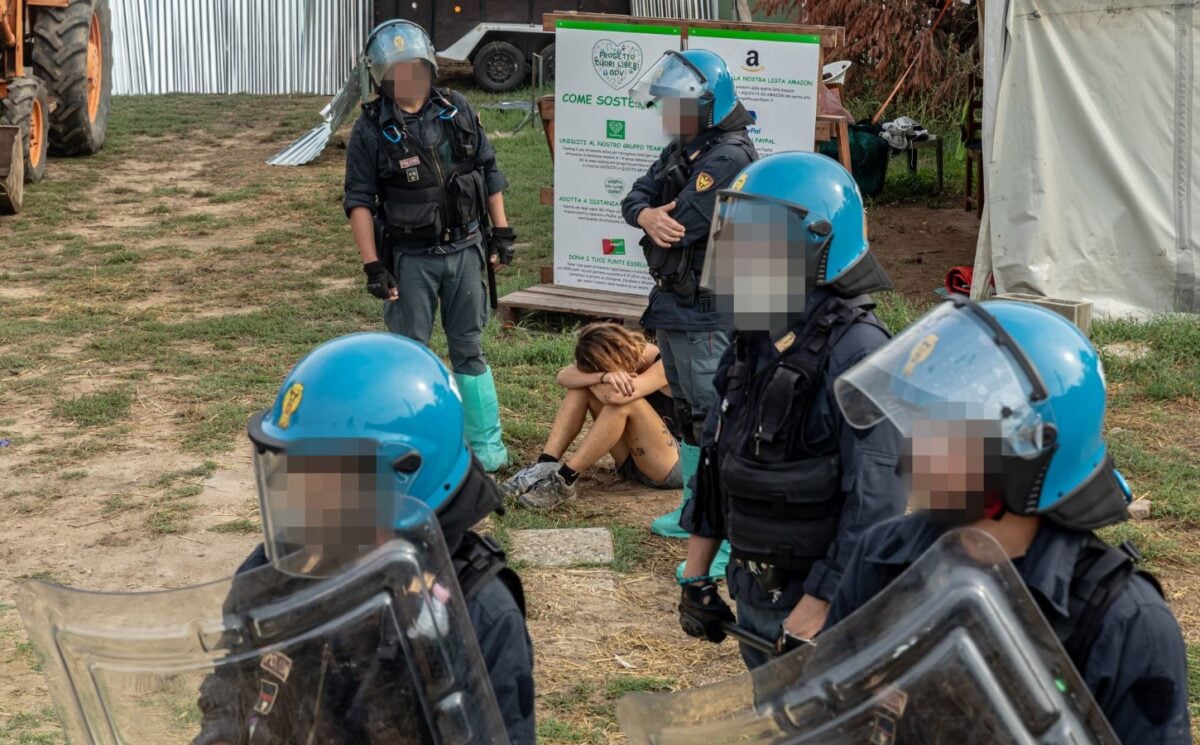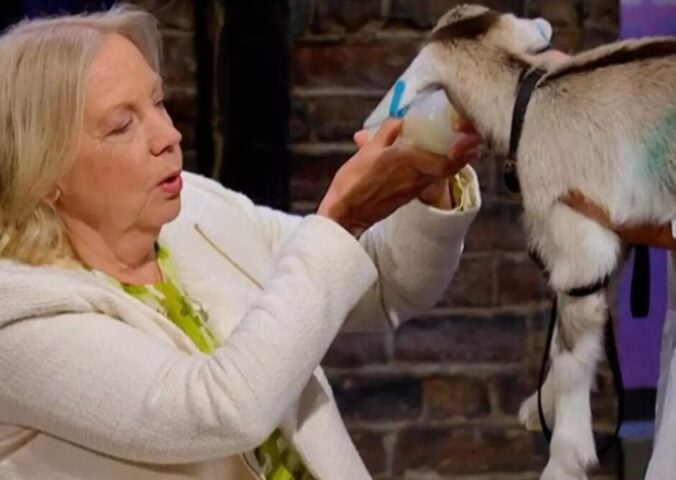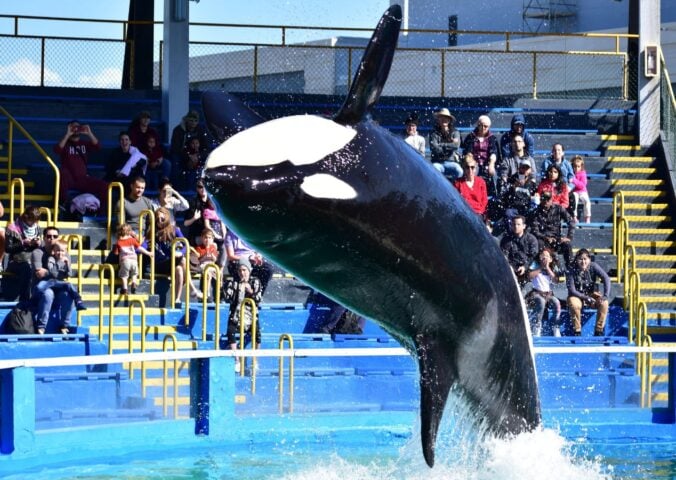Last week, nine riot police vans pulled up at Cuori Liberi animal sanctuary in Pavia, Italy. They were there to kill nine rescued pigs because they lived within an African Swine Fever (ASF) outbreak area.
Videos show police dragging away activists who had turned up to protect the pigs. According to the sanctuary, vets from the local authority then killed the animals. The killing, which activists have described as a “massacre,” took place out of sight of sanctuary staff.
The killings were ordered by Italian authorities as part of government policy to stop the spread of ASF. The disease is a threat to the profitability of the pig farming industry. This year, 34,000 pigs have so far been slaughtered on 12 farms within the Lombardy region where Pavia is located.
Unnecessary deaths
The sanctuary has confirmed that it lost 38 pigs to ASF over the preceding three weeks. Of the nine that remained, some had the virus but their symptoms had improved. Others were said to be perfectly healthy. ASF is fatal in 30 to 100 percent of cases within one to three weeks after infection. The virus poses no risk to humans. Valentina Verri from animal protection group Vitadacani told Plant Based News the authorities used the supposed threat to public health to justify their actions.
The sanctuary and the groups supporting it had tried to find another course of action with the local authorities. Verri said that they tried to convince them to use the sanctuary as a case study so ASF could be studied properly.
“We were asking for a roundtable with the institutions and with the government, because we appreciate [ASF] is a huge massive problem,” she said. They could try out different “medicines, different types of cures, see what works, see what doesn’t. [The sanctuary owners] knew these animals inside out, they would have been able to give very specific details on how they work would have reacted to certain medicines … to maybe find a different solution to this to how we manage these swine fever outbreaks. But there is obviously no interest in doing this.”
Researchers have identified significant gaps in knowledge about the transmission and biosecurity management around ASF.
The sanctuary says that it tried to convince the authorities to let their own vet come and put the pigs to sleep if that was necessary. The outcome they wanted to avoid was the pigs being gassed or shot, as happens on farms with ASF outbreaks. The authorities are said to have refused to provide any assurances about how the pigs would be killed.
The day before the pigs were killed at Cuori Liberi, the International Organization for Animal Protection (OIPA) sent an urgent request to authorities to spare their lives. It pointed out that the animals were isolated and not destined for the food chain, meaning they were not at risk of spreading ASF further.
The plea, as subsequent events show, fell on deaf ears.
Risks of the police raid
Activists say the pigs at the sanctuary posed no threat to public health or other pigs. But the arrival of the police arguably increased the risk of spreading the virus.
ASF can be spread by contact with infected pigs, their waste or body fluids; contaminated equipment, vehicles, and clothing; and by pigs being fed contaminated meat products. The activists who defended the sanctuary tried to carefully follow biosecurity measures so as not to spread ASF further.
“We [activists] never even entered the area where the pigs were,” said Verri. “Nobody ever went there, only the two owners and the volunteer that lives there. And none of them had even left at the sanctuary for three weeks, since their first case of swine fever weeks before the place got put under quarantine.”
But when the police arrived, they didn’t seem concerned about following biosecurity measures. The videos from the day at Cuori Liberi clearly show activists wearing disposable overalls while riot police wore only coverings over their boots.
Verri said the activists had prepared tubs of water and disinfectant for people to put their feet in. But many of the police officers “didn’t even bother and just got back in their police van and left.”
Plant Based News has approached the police force for comment.
Where did ASF come from?
ASF is endemic to sub-Saharan Africa, where it is spread by ticks to wild pigs, bushpigs, and warthogs. As these pigs have co-evolved with the virus, they tend not to show any symptoms.
The first outbreak outside the virus’s natural region was in 1957, when contaminated food waste from an airline was fed to pigs near Lisbon airport. ASF can survive for a long time in meat from infected animals. This has been the main source of its transmission across the globe.
ASF has spread to many new countries since 2007, when the improper disposal of contaminated meat at a ship port spread it to Georgia. In 2018 it appeared in China and spread around Asia. The global pork industry has changed significantly as a result of millions of pigs dying and being slaughtered to contain the disease.
The repercussions have been clearest in China, the world’s largest consumer and importer of pork products. The country had previously relied on millions of back-yard and small scale pig farmers for its domestic pork supply. But due to these farms having poor biosecurity, China is now moving towards highly intensive forms of farming.
A 26-storey biosecure pig farm recently opened in Hubei province with the capacity to slaughter a million pigs a year. To make up for the devastation wrought to its pig industry by ASF, China has also invested heavily in opening industrial pig farms in Argentina to export pork to China. Indigenous communities have objected to the farms on the grounds that they violate their rights and will harm the environment.
Similarities with avian flu
The ASF crisis echoes the avian flu crisis that has seen millions of farmed birds culled globally and devastated wild bird populations.
Like ASF, avian flu originally circulated relatively harmlessly within wild bird communities. But the H5N1 strain of the virus first emerged on a Chinese goose farm in 1996. In 2022, there were outbreaks of H5N1 in 67 countries, 131 million farmed birds culled or dead as a result.
Evidence indicates that low pathogenic avian flu strains (not likely to be deadly) have mutated into high pathogenic (deadly) strains on farms. Intensive farming creates the right conditions for such viruses to mutate and spread rapidly. These deadly strains have then infected wild birds, killing many and making them vectors of the disease.
Like avian flu, ASF has become a problem because of animal farming.
“Once again it is confirmed that the real choice capable of averting such disasters is to no longer feed on sentient beings,” said OIPA in a statement.
Abuse of power?
The events at Cuori Liberi appear to be another example of how law enforcement is increasingly being used to seemingly protect the interests of the meat industry. Some activists have pointed out that the deployment of dozens of riot police to kill ten pigs seems excessive by any measure.
Elsewhere in the world, particularly the US, there is a similar trend of seemingly excessive use of police resources in cases involving animals. In 2022, officers drove hundreds of miles across California to seize Cedar the Goat from a child who wanted to spare his life rather than sell him for slaughter as part of the 4-H program. After activists rescued two sick piglets from a Smithfield pig farm in Utah in 2017, FBI agents pursued them across state lines to retrieve Smithfield’s “property”.
“Just imagine if this was your dog or your cat and somebody just walked up to your door and said, there’s a virus out there that affects the economy of dog meat, so we’re going to have your dog put down,” said Verri. “Anybody would try and stop that from happening.”





